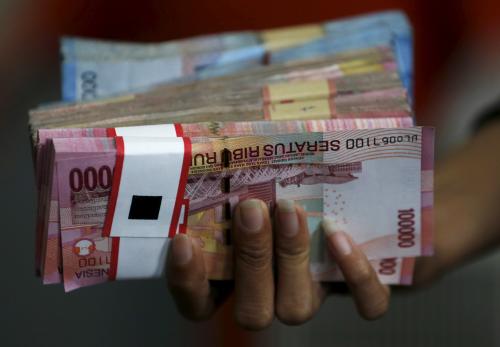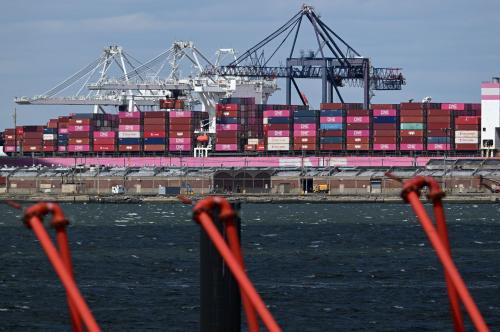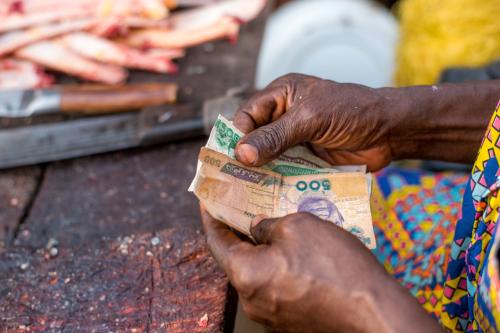The pandemic has propelled debt distress to the forefront of the policy agenda. A series of debt defaults in developing countries has occurred in 2020. 2021 could see a lot more defaults as more low- and middle-income countries are running out of fiscal and monetary capacity while they still confront the health and economic challenges from the pandemic. These countries need more funding to fight the health crisis they face, more investment, and more infrastructure financing to combat climate change. Yet, debt sustainability issues represent a barrier to the flow of new financing toward value-creating investments.
The international community, the World Bank, the International Monetary Fund, and also regional development banks (RDBs), have provided some financial support and debt relief. In November 2020, the G-20 agreed to extend a freeze on official debt service payments (Debt Service Suspension Initiative or DSSI) until mid-2021 and exhorted private sector actors to participate on equal terms. Coming after the DSSI, the Common Framework initiated by the G-20 provides critical assistance to countries in debt distress.
The Common Framework allows countries to benefit from comparable treatment in debt relief by official bilateral creditors in countries participating in the initiative, including China, which has become a major bilateral creditor to developing countries—especially those in Africa. The framework opens the possibility of the private sector providing similar debt relief on a participatory basis but details regarding implementation still have to be ironed out.
But along with the G-20 debt service suspension initiative, RDBs have also played a critical role. RDBs are nimbler, have their ears closer to the ground, and are often faster to respond. Together they have disbursed around $50 billion so far to help developing countries through the pandemic.
The narrow view and its consequences
Certain rating agencies have warned that the countries requesting assistance through the G-20 Common Framework could face downgrades. Their reasoning is that the Common Framework will automatically bind private creditors to offer some debt relief even though that has not yet been worked out.
As a result, eligible countries in debt distress are reluctant to ask for relief through the Common Framework. Countries have traditionally been loath to seek relief for fear of triggering a credit downgrade and cutting off access to international capital markets. But the experience with debt distress is that the longer countries wait, the more painful the restructuring will be and the worse the consequences for growth.
A cascade of defaults could trigger a downgrade of the balance sheets of regional development banks through their shareholding structure. RDBs, which typically have conservative management practices, rely on their AAA ratings to raise funds from markets. Losing their AAAs would in turn limit the ability of RDBs to lend a helping hand to the very member countries running out of liquidity and most in need of funding and investment during the worst crisis of our times.
The broader view and the imperative of coordination
The severity of the pandemic-induced crisis has led advanced economies to do whatever it takes in unprecedented domestic fiscal and monetary interventions. Developing countries have not been able to do the same because of their limited fiscal and monetary capacity. Preserving and expanding the financial capacity of international financial institutions, especially RDBs, as was done in 2009 following the global financial crisis, is currently the only way of providing lender-of-last-resort support for developing countries fighting COVID-19. These institutions which offer zero- to low-interest financing and long maturities, and which provide necessary oversight in channeling funding to valuable projects, are best-equipped to help developing countries cope with this pandemic crisis.
The prospective downgrades of individual countries announced by rating agencies potentially cascading onto a downgrade of RDBs will only hamper the ability of these institutions to perform their functions effectively. The international community should not tolerate such a scenario; they should provide a strong backstop to RDBs. Considering that the capital of RDBs is paid in reserve currencies, major economies should offer that backstop. They should consider doing so in the same way that their own economies are supported through the actions of their central banks.
The rationale for these extraordinary actions to coordinate a systematic RDB response to the crisis is in line with the imperative for global coordination to eradicate the virus. Previous experience in fighting smallpox suggests that the benefit-cost ratio for assisting its eradication exceeded 400:1. Similarly, the cost of inaction, both economic and social, would be enormous. The payoff of an expanded and coordinated response by RDBs is huge. Preserving and expanding the financial capacity of RDBs is a key pillar of the coordinated action to preserve the global economy.
RDBs can also help coordinate debtor countries’ efforts to obtain debt relief without collateral damage in the context of the G-20 Common Framework. Indeed, the treatment of individual countries in isolation by rating agencies, and the failure to see the systemic nature of the crisis should be balanced with the interests of debtor countries and the cost to the global economy. If countries individually become reluctant to use the Common Framework to obtain debt relief, they will likely be subject to messy and prolonged debt restructuring episodes that would come too late and do too little to help reignite growth. These waves of defaults will also damage capital markets for a long time. Importantly, the network of RDBs has an important role in channeling crisis response funding in a more efficient and coordinated way than is currently done through private capital markets, which alternate between sudden stops and search-for-yield, highly risky speculative funding.
Evidence available from DSSI suggests that the debt relief provided has helped lower the cost of borrowing. The Common Framework is too recent a creation to be assessed empirically but there is no reason to assume that a framework aimed at alleviating the debt burden of countries in distress in an orderly and limited way would be harmful. While a maturity extension of debt will qualify as a technical default and cut the country off capital markets, one should not lose sight of the fact that the very same debt relief also allows the country to put its financial house in order. The temporary loss of market access is not a calamity, but a necessary step to eliminate debt overhang, reignite growth, and thereby regain access to capital markets. A coordinated approach by debtor countries led by RDBs in the context of the Common Framework could go a long way to avoid a downward spiral triggered by an avalanche of downgrades and defaults.
In sum, it is imperative that: (1) shareholders of RDBs especially from the major economies provide the necessary backstop to avoid the cascading effect of downgrades from ratings of borrowing countries onto RDBs and; (2) RDBs coordinate debtor countries to form a coalition of interests in the context of the Common Framework. Early efforts at coordination, as opposed to a laissez-faire approach, will limit the cost of rebuilding post COVID-19 and preserve international capital markets in the short and medium run.
The Brookings Institution is committed to quality, independence, and impact.
We are supported by a diverse array of funders. In line with our values and policies, each Brookings publication represents the sole views of its author(s).








Commentary
To recover from COVID-19, support regional development banks
March 23, 2021